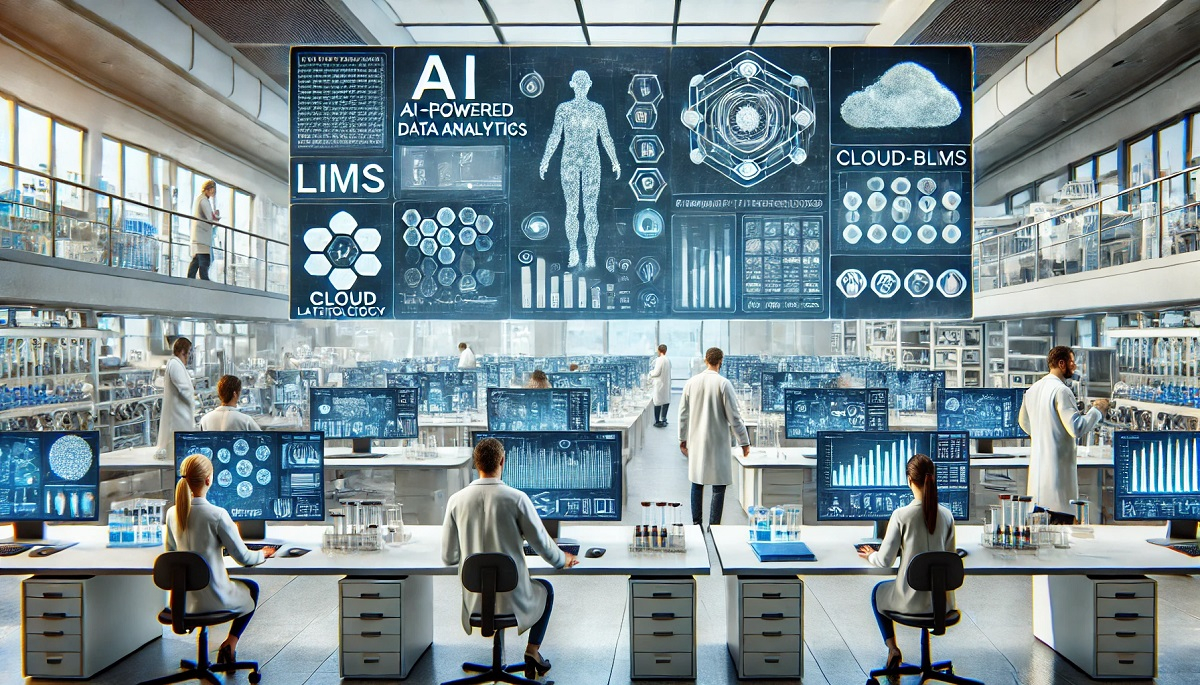Laboratory Information Management System (LIMS) Market Size and Growth Analysis
The Laboratory Information Management System (LIMS) market is poised for significant growth between 2024 and 2032, driven by advancements in various industries like pharmaceuticals, biotech, chemical, agriculture, and more. LIMS solutions, available in multiple delivery models such as on-premise, cloud, SaaS, PaaS, and IaaS, provide robust data management and automation capabilities to streamline laboratory processes.
The market is segmented by industry, with notable demand from Contract Research Organizations (CROs), Contract Manufacturing Organizations (CMOs), and food and beverage sectors.
The software component remains central, while services offered by partners and customer ecosystems (including product services and proposition features) play a key role in shaping competitive dynamics and regional footprints, as analyzed by MarketDigits.
The Laboratory Information Management System (LIMS) market is expected to be valued at USD 2.13 billion in 2024 and is projected to grow to USD 3.99 billion by 2032, registering a compound annual growth rate (CAGR) of 7.20% during the forecast period from 2024 to 2032.
Drivers of Growth
The significant rise in demand for LIMS is attributed to its ability to optimize laboratory processes, ensure data integrity, and meet the regulatory requirements of various industries such as pharmaceuticals, biotechnology, food and beverage, chemicals, and environmental testing.
The shift toward automation, cloud-based LIMS solutions, and the increasing need for accurate and secure data management are key factors driving this market's expansion. As industries continue to adopt digital solutions for greater efficiency and compliance, the LIMS market is poised to sustain strong growth through 2032.
Get the Sample Research Report Copy on Laboratory Information Management System Market: https://www.marketdigits.com/request/sample/38
Why the Demand for Laboratory Information Management Systems (LIMS) Has Increased in Recent Years
Advancements in Laboratory Automation: The integration of automation technologies in laboratories has significantly increased the volume and complexity of data generated. LIMS solutions are essential for managing this data efficiently, ensuring accuracy, and streamlining laboratory workflows.
The laboratories are increasingly adopting automation and the demand for robust LIMS systems continues to rise to manage the growing data complexity.
Stringent Regulatory Compliance: Pharmaceutical, biotechnology, and other industries are subject to rigorous regulatory requirements, and maintaining compliance is important. LIMS assist in ensuring data integrity, traceability, and compliance with the standards set by regulatory bodies, reducing the risk of non-compliance.
This is a significant factor driving the increased adoption of LIMS, particularly in industries where maintaining strict regulatory standards is paramount.
Technological Advancements: Technological progress, particularly the development of cloud-based LIMS solutions, has enhanced accessibility, scalability, and cost-effectiveness for laboratories. These cloud-based systems enable remote data management, improve collaboration, and enhance operational efficiency.
The shift to cloud-based LIMS systems has contributed to their growing demand, as laboratories seek modern, flexible solutions that can scale with their needs.
Emphasis on Quality Control and Assurance: The growing focus on quality control and assurance across various industries has amplified the need for LIMS solutions. These systems are crucial in monitoring and maintaining the high-quality standards required in laboratory processes.
LIMS ensure that laboratory activities meet regulatory and organizational quality requirements, driving their increased adoption in sectors such as pharmaceuticals and food testing.
Increased Research and Development Activities: Research and development (R&D) activities, particularly in life sciences, have surged in recent years, leading to a higher demand for efficient data management solutions. LIMS help organize and analyze large datasets, supporting complex research processes.
The rise in R&D across diverse industries has consequently driven the need for advanced LIMS to manage scientific data effectively.
Why the Demand for LIMS is Projected to Increase in the Coming Years
Growing Adoption of Artificial Intelligence (AI) and Data Analytics: The laboratories are increasingly adopting artificial intelligence (AI) and data analytics for enhanced decision-making and predictive analysis which create a rising demand for advanced LIMS systems capable of handling complex datasets.
These systems are essential for processing large volumes of data, providing actionable insights, and improving laboratory outcomes, driving the future growth of the LIMS market.
Expansion of Biobanks and Genomic Research: The growing establishment of biobanks and genomic research initiatives has created a need for robust data management systems. LIMS play an essential role in storing, tracking, and analyzing biological samples, which is important for advancing personalized medicine and genomic research.
This trend is expected to further drive the demand for LIMS solutions in the coming years.
Rising Demand for Laboratory Outsourcing: There is an increasing trend toward outsourcing laboratory services to Contract Research Organizations (CROs) and Contract Manufacturing Organizations (CMOs).
These organizations require efficient LIMS systems to manage diverse client data and ensure consistent quality across multiple projects. This growing trend of laboratory outsourcing is expected to further fuel the demand for LIMS in the coming years.
Get the complete view of 180 Pages Market Research Report on Laboratory Information Management System: https://www.marketdigits.com/laboratory-information-management-system-lims-market
Top Innovations and Technologies in Laboratory Information Management Systems (LIMS) by Leading Companies
Thermo Fisher Scientific Inc.
Thermo Scientific™ SampleManager™ LIMS: Thermo Fisher's SampleManager™ LIMS provides a comprehensive data management solution that ensures laboratory productivity and regulatory compliance. The system integrates seamlessly with various laboratory instruments, offering a unified platform for data analysis and reporting.
It optimizes laboratory workflows and improves decision-making through real-time data management.
LabWare, Inc.
LabWare LIMS and ELN: LabWare offers an integrated LIMS and Electronic Laboratory Notebook (ELN) system that streamlines data management and enhances laboratory collaboration. This unified platform improves compliance and data integrity across laboratory operations.
The system is designed to meet the diverse needs of laboratory environments, providing users with powerful tools for sample tracking and reporting.
LabVantage Solutions, Inc.
LabVantage 8: LabVantage 8 is a robust LIMS solution that delivers advanced features such as sample tracking, data analysis, and reporting. It is specifically designed to improve laboratory efficiency, ensure data integrity, and help laboratories comply with regulatory standards.
LabVantage 8 supports a wide range of industries, providing a comprehensive solution for laboratory data management.
Abbott Laboratories
STARLIMS™ Laboratory Software: Abbott’s STARLIMS™ software is a leading LIMS solution that enhances laboratory efficiency and data integrity while ensuring compliance with regulatory requirements.
This software includes features such as sample tracking, data analysis, and reporting, all tailored to meet the unique needs of various industries. STARLIMS™ supports streamlined operations in laboratories, ensuring precise and timely results.
Waters Corporation
Waters NuGenesis® Lab Management System: Waters’ NuGenesis® Lab Management System integrates data management, compliance, and collaboration features into one comprehensive platform. It is designed to improve laboratory operations by enhancing data integrity, ensuring compliance with industry regulations, and streamlining workflows.
This system enables laboratories to manage large datasets efficiently while maintaining regulatory compliance.
Agilent Technologies, Inc.
Agilent CrossLab Connect: Agilent’s CrossLab Connect is a digital platform that empowers laboratories to optimize operations through real-time data analytics, instrument performance monitoring, and predictive maintenance.
This platform helps reduce downtime, improve productivity, and streamline laboratory workflows, making it an essential tool for modern laboratories focused on operational efficiency and enhanced performance.
The Growing Role of Laboratory Information Management Systems (LIMS) in Modern Laboratories
The Laboratory Information Management System (LIMS) has become an essential tool for modern laboratories, enabling streamlined workflows, precise sample tracking, data analysis, and efficient reporting. Over the years, the demand for LIMS software solutions has surged, fueled by the increasing need for automation and robust data management across industries such as healthcare, pharmaceuticals, biotechnology, and chemicals.
A key advantage of a LIMS system is its ability to manage sample data throughout its lifecycle—from initial receipt to analysis and final reporting. These systems not only enhance laboratory efficiency but also reduce the likelihood of human error, ensuring smooth operations and compliance with regulatory standards.
As a result, more laboratories are turning to LIMS solutions to improve operational workflows, maintain data integrity, and meet industry requirements effectively.
Get a Discount on the Premium Research Report on Laboratory Information Management System Market: https://www.marketdigits.com/request/discount/38
Laboratory Inventory Management within LIMS
An essential feature of modern LIMS software is its ability to integrate laboratory inventory management. Laboratories depend on inventory tracking systems to manage reagents, consumables, and other vital supplies. By incorporating inventory management into LIMS, laboratories can minimize errors, optimize resource utilization, and reduce waste, ensuring compliance with industry standards.
Integrating inventory management within a LIMS platform provides a cohesive solution that ties sample tracking, data management, and inventory control together into one unified system. This integration enhances the overall operational efficiency and data accuracy within the lab.
LIMS Solutions Tailored for Small Laboratories
For small laboratories, implementing a LIMS system might initially seem daunting due to budget constraints and concerns over complexity. However, modern LIMS solutions for small laboratories are designed to be scalable, cost-effective, and user-friendly. These systems typically offer a range of core functionalities such as sample tracking, data analysis, and basic reporting, making them accessible even for smaller operations.
By adopting a simplified LIMS solution, small labs can benefit from increased efficiency, improved data management, and streamlined compliance with regulatory requirements. These systems allow smaller labs to maintain high standards without the need for large-scale investments in complex infrastructure.
Choosing the Best LIMS Software Solutions for Laboratories
Selecting the best LIMS software for your laboratory depends on several factors, including the lab’s size, budget, and specific operational needs. Leading LIMS providers offer solutions that cater to a wide range of laboratories, from large-scale commercial labs to specialized research facilities.
The most effective LIMS solutions are often cloud-based, providing real-time data access, seamless collaboration, and efficient integration with laboratory instruments. These platforms not only help with sample and data management but also offer robust reporting features, advanced data analytics, and comprehensive compliance management.
With so many options available, labs can select the LIMS system that best suits their unique needs while ensuring operational efficiency and data accuracy.
Frequently Asked Questions (FAQs) about the Laboratory Information Management System (LIMS) Market
What is LIMS in a Laboratory?
A Laboratory Information Management System (LIMS) is a specialized software solution designed to manage samples and associated data within a laboratory environment. It automates workflows, integrates laboratory instruments, and ensures efficient data management.
By using a LIMS, laboratories can track and manage sample data throughout its lifecycle, from initial receipt to analysis and final reporting.
This helps enhance efficiency, improve operational workflows, reduce human error, and ensure data integrity, ultimately leading to more accurate and timely results.
Which Industries Use LIMS?
LIMS software is used across various industries to streamline laboratory operations and maintain compliance with regulatory standards. Key industries that benefit from LIMS include:
Healthcare and Pharmaceuticals: LIMS helps manage patient samples, clinical trials, and ensures compliance with industry regulations such as Good Laboratory Practice (GLP).
Biotechnology: In biotechnology, LIMS is used to manage research and development processes, including genetic sequencing and protein analysis.
Environmental Testing: LIMS plays a crucial role in monitoring and analyzing environmental samples to detect pollutants and ensure safety.
Food and Beverage: Laboratories in this sector use LIMS to ensure product quality and safety, as well as compliance with health and safety regulations.
Material Testing: In material science, LIMS is used to conduct mechanical, chemical, and corrosion tests, especially in industries like aerospace and manufacturing.
What Are the Benefits of LIMS?
Implementing a LIMS offers numerous advantages, making it an essential tool for laboratories:
Enhanced Efficiency: By automating routine tasks and workflows, LIMS helps reduce manual errors, speed up data processing, and improve overall laboratory efficiency.
Improved Data Integrity: LIMS centralizes the management of sample data, ensuring it is accurate, secure, and easily accessible for analysis and reporting, while helping laboratories maintain compliance with regulatory standards.
Streamlined Workflows: LIMS integrates various laboratory instruments and processes, facilitating a seamless workflow that reduces operational bottlenecks.
Regulatory Compliance: LIMS helps laboratories meet industry-specific regulations by maintaining accurate records, audit trails, and real-time data reporting, which is essential for passing inspections and audits.
Cost Savings: By optimizing resource utilization, reducing waste, and improving process efficiencies, LIMS helps laboratories achieve cost savings and maximize the value of their operations.
What Is the Best LIMS Software?
Selecting the optimal Laboratory Information Management System (LIMS) software is crucial for laboratories seeking to improve efficiency, ensure data integrity, and comply with industry regulations. The ideal LIMS solution varies depending on the specific needs of the laboratory, such as size, budget, and operational requirements. Below are some of the top LIMS software solutions recognized for their capabilities:
LabVantage: LabVantage offers a comprehensive cloud-based LIMS and Electronic Lab Notebook (ELN) solution, providing robust features like sample management, inventory control, and advanced reporting capabilities.
LabVantage is particularly favored by large-scale pharmaceutical companies for on-premises deployments. The most recent version, LabVantage 8.8, was released in December 2022.
GenoFAB: Known for its user-friendly interface and strong data management features, GenoFAB streamlines laboratory workflows, enhances data integrity, and improves productivity. Its ease of use makes it a popular choice among laboratories focused on efficiency and data accuracy.
Scispot: Scispot is rapidly gaining popularity as a LIMS provider for modern biotech and diagnostic laboratories. Its intuitive software facilitates scaling, enhancing workflows by automating tasks like sample intake, data transfer, validation, and reporting. This makes Scispot a great choice for labs needing efficient sample processing.
STARLIMS: STARLIMS is a versatile LIMS solution that caters to various industries, including healthcare, pharmaceuticals, and environmental testing. With its robust features for sample tracking, data analysis, and compliance management, STARLIMS is renowned for its scalability and seamless integration with laboratory instruments and software systems.
QBench: QBench is an ideal LIMS solution for small to mid-sized laboratories. Offering essential features such as sample management, data analysis, and reporting, it is a cost-effective option that provides laboratories with streamlined workflows and the ability to manage complex data, making it suitable for labs with limited resources.
Other Trending Reports
Healthcare Gamification Market: https://www.marketdigits.com/healthcare-gamification-market-1718965153
Prescription Delivery Service Market: https://www.marketdigits.com/prescription-delivery-service-market-1719387071
Spatial Genomics Market: https://www.marketdigits.com/spatial-genomics-market-1720506392
Medical Equipment Maintenance Market: https://www.marketdigits.com/medical-equipment-maintenance-market-1720597634
Minimally Invasive Surgical Instruments Market: https://www.marketdigits.com/minimally-invasive-surgical-instruments-market-1720605212
Social determinants of health market: https://www.marketdigits.com/social-determinants-of-health-market-1721284780
Urinalysis Market: https://www.marketdigits.com/urinalysis-market-1721287634
Body Composition Analyzers Market: https://www.marketdigits.com/body-composition-analyzers-market-1721289154
Asia-Pacific Women's Digital Health Market: https://www.marketdigits.com/asia-pacific-womens-digital-health-market-1721289882
Genetic Toxicology Testing Market: https://www.marketdigits.com/genetic-toxicology-testing-market-1721711163



